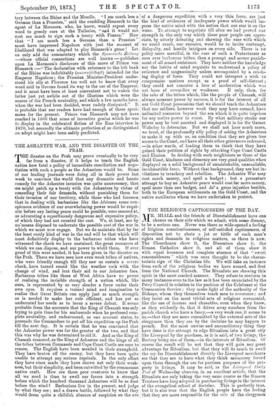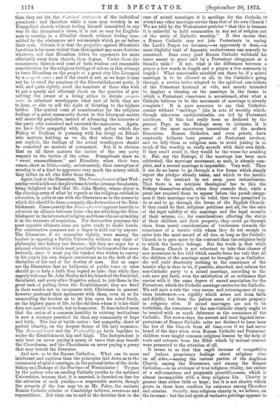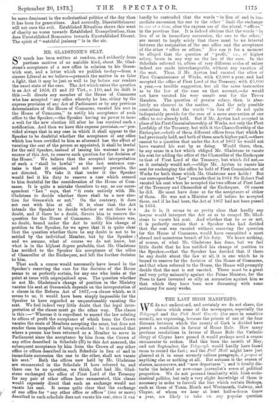THE RELIGIOUS CAPTIOUSNESS OF THE DAY.
TR. MIA.LL and the friends of Disestablishment have one 111 chance on their side which we admit, with some dismay, to be a serious one. Never was there so wide-spread a feeling of litigious conscientiousness, of self-satisfied captiousness, of disposition not to abate a jot or tittle of each man's rights and demands in religious matters, as there is now. The Churchmen show it, the Dissenters show it, the Roman Catholics show it, and all of them show it with equal keenness and complete absence of that "sweet reasonableness" which was once thought to be the charac- teristic sign of the Christian life. We will take an instance from each of the religious bodies we have named, and first from the National Church. The Ritualists are showing this spirit in the most marked manner. They refuse to conform in many instances even to the law as it has been enunciated by the Privy Council in relation to the position of the Celebrant at the Communion Service ; they make light of the authority of the Bishops, whom they themselves teach men to reverence ; and they insist on the most trivial acts of religious ceremonial, like the use of incense and chasubles, even when they know, as they evidently do, that it drives away numbers from the parish church who have a fancy,—a very weak one, it seems to us,—that they are more committed by the external acts of the clergyman than they are by the doctrine he may happen to preach. But the most unwise and unconciliatory thing they have done is the attempt to edge Ritualism into a great city like Liverpool by the purchase, as it is said, of two livings, the Rectory being one of them,—in the interests of Ritualism. Of course the result will be not that they will gain any great advantage for Ritualism, but that they will do much to swell the cry for Disestablishment directly the Liverpool merchants see that they are to have what they think mummery forced upon them through the use for partisan purposes of the pro- perty in livings. It may be said, as the Livelpool Dailij Post of Wednesday observes, in an excellent article, that the Ritualists are only taking the very same course as the Simeon Trustees have long adopted in purchasing livings in the interest of the evangelical school of doctrine. This is perfectly true, but it is also true that the English people have the feeling that they are more responsible for the acts of the clergymen
than they are for the doctrinal statements of the individual preachers ; and therefore while a man may worship in an Evangelical church without feeling himself committed in any way to the incumbent's views, it is not so easy for English- men to worship in a Ritualist church without feeling com- mitted by the obeisances and ceremonials which go on before their eyes. Certain it is that the prejudice against Ritualistic functions is far more violent than that against any mere doctrine whatever, and that Ritualism drives its opponents far more effectually away from church, than dogma. Under these cir- cumstances, there is real want of both wisdom and reasonable consideration for the religious feelings of others in this attempt to force Ritualism on the people of a great city like Liverpool by a coup de main ; and if the result is not, as we hope it may not be, to swell the numbers of the Disestablishment party, it will, and quite rightly, swell the numbers of those who wish to put a speedy and effectual check on the practice of per- mitting the owner of a living either to dictate proprio mom u to reluctant worshippers what sort of faith they are to hear, or else to sell the right of dictating to the highest bidder. The cynical want of consideration for the religious feelings of a great community shown in this Liverpool matter will assuredly prejudice, instead of advancing the interests of the party who conceived and executed the manceavre. Again, we have little sympathy with the harsh policy which the Bishop of Durham is pursuing with his clergy on Ritual- istic matters, holding, as we do, that where the law is not explicit, the feelings of the actual worshippers should be consulted on matters of ceremonial. But it is obvious that on all these matters the tactics of the one party respond to the tactics of the other. Evangelicals show no " sweet reasonableness," and Ritualists, when their turn comes, show as little,—only, unfortunately, their conception of worship is of a kind to aggravate very much the misery which they inflict on all who differ from them.
Again, look at the Dissenters. TheiVonconformist of last Wed- nesday week holds out the olive branch to the extreme Secularists, being delighted to find that Mr. John Morley, whose object is the clearing-away of what he regards as the religious rubbish in education, is quite at one with the Dissenters as to the means by which this should be done,—namely, the destruction of the Esta- blishment. Consequently the Nonconformist appears heartily to advocate an alliance between those who are attacking the Esta- blishment in the interests of religion, and those who are attacking it in the interests of scepticism. For destructive purposes the most opposite ultimate aims are quite ready to shake hands. For constructive purposes not a finger is held out by anyone. The Dissenters, if we remember rightly, were among the loudest in opposing a Dublin University without any chair of philosophy and history last Session ; but they are eager for a primary education which must practically be truncated far more seriously, since it must gag the teacher who wishes to convey to his pupils his own deepest convictions as to the drift of the discipline of life and of the destiny of man. But so eager are the Dissenters that no halfpenny of public taxes or rates should go to help a faith they regard as false, that while they eagerly welcome Mr. John Morley and his friends of the Positivist, Secularist, and every other Negative school, to join them in the great task of pulling down the Establishment, they are fixed in their resolve not to co-operate with Christians in general, however profound their agreement with them, even in so far =muzzling the teacher as to let him open his mind freely, on the highest parts of life, to the children whom it is his chief duty not merely to teach, but to humanise. It does indeed seem that the union of a common hostility to existing institutions is now a stronger practical tie than any community of hope and faith. The line of battle unites ; but sympathy, short of perfect identity, on the deepest things of life only separates. The Nonconformist and the Fortnightly go forth together to strike the Establishment hip and thigh. The Independent is only bent on never paying a penny of taxes that may benefit the Churchman, and the Churchman on never paying a penny that may benefit the Dissenter.
And now, as to the Roman Catholics. What can be more intolerant and captious than the principles laid down as to the ceremonial of mixed marriages, in the pastoral letter of the Arch- bishop and Bishops of the Province of Westminster ? We pass by the jealous veto on sending Catholic youths to the national Universities, because that, it is asserted, is founded on fear for the salvation of such youths,—a respectable motive, though the grounds of the fear may be, as Mr. Paley, the eminent Roman Catholic scholar at Cambridge believes, erroneous and superstitious. But what can be said of the doctrine that in the
case of mixed marriages it is sacrilege for the Catholic to attend any other marriage service than that of his own Church I We are told by the Westminster prelates "that this is because it is unlawful to hold communion in any act of religion out of the unity of Catholic worship." If this means that a Roman Catholic may not join Protestants in saying the Lord's Prayer for instance,—as apparently it does,—a more frightful trait of dogmatic exclusiveness can scarcely be- conceived. Does every good Roman Catholic withhold his inner assent to grace said by a Protestant clergyman at a friend's table ? If not, what is the difference between a. prayer a few words in length and a prayer a few sentences in length ? What conceivable mischief can there be, if a mixed, marriage is to be allowed at all, in the Catholic's going through a service better adapted to the spiritual convictions of the Protestant husband or wife, and merely intended to implore a blessing on the marriage in the forms to which a Protestant conscience is accustomed, after what a Catholic believes to be the sacrament of marriage is already complete ? It is pure nonsense to say that Catholics cannot without " sacrilege " join in acts of worship which, though otherwise unobjectionable, are led by Protestant
ministers. If this has really been so declared by the present Pope, as the Bishops seem to intimate, it is one of the most monstrous innovations of the modern Romanism. Roman Catholics, and even priests, have constantly hitherto been present at Protestant services, and we defy them as religious men to avoid joining in so much of the worship as really accords with their own faith. If they could avoid it, they would be the worse for avoiding it. But, say the Bishops, if the marriage has been once celebrated, the marriage sacrament, as such, is already com- plete, and a second marriage is impossible. Very well. Then it can do no harm to go through a few forms which simply repeat the pledges already taken, and which to the heretic party to the contract do not seem pure redundancies. That there is no intrinsic theological bar to this the Bishops themselves admit, when they concede that, while a penal law required them to appear before the parish clergy- man if their marriage was to be valid, they were permitted to do so and to go through the forms of the English Church. If they could do that, religious petitions and all, for the sake of the legal validity of the marriage and the legal security of their estates, i.e., for considerations affecting the status of their children and their property, they could go through them from moral considerations of tenderness towards the- conscience of a heretic with whom they do not scruple to- enter into the most sacred of all ties, so long as the Catholic Church is to gain more by the contract than the religious body to which the heretic belongs. But the truth is, that while the Roman Church is not reluctant to take that chance of new accessions to her fold which results from her rule that all, the children of the marriage must be brought up as Catholics, she will yield absolutely nothing to the conscience of the heretic who is thus to be, if possible, absorbed, and refuses the non-Catholic party to a mixed marriage, according to the rule now put forth, even the satisfaction of an ordinance that carries with it the same degree of sacred association for the Protestant, which the Catholic marriage carries for the Catholic. We call such a rule the very excess and extravagance of cap- tious intolerance, —a rigidity which arises not from faith and fidelity, but from the jealous sense of private property in religious rites. If mixed marriages are not to be forbidden, the conscience of the non-Catholic clearly ought to, be treated with as much deference as the conscience of the Catholic. But now-a-days, the newest and most bigoted inter- pretations of Roman Catholic rules are declared to have been the law of the Chu.ch from all time,—as if we had never heard of the days when even Roman Catholic and Protestant children were taught common religious lessons by the help of texts and extracts from the Bible which by mutual consent were presented to the attention of all.
It seems to us that this rapid increase of competitive and jealous proprietary feelings about religious rites on all sides,—among the various parties of the Anglican. Church, among the Dissenters, and among the Roman, Catholics,—is no evidence of true religious vitality, but rather of a self-conscious and pragmatic punctiliousness, which is almost incompatible with a deep religious life. Charity is greater than either faith or hope ; but it is not charity which grows in these keen conflicts for existence among Churches. and coteries. Socially, true religious charity is, we believe, on the increase ; hut the evil spirit of Axolusive privilege appears to
be more dominant in the ecclesiastical politics of the day than it has been for generations. And assuredly, Disestablishment will not cure the evil. Established Ritualism shows this want I of charity no worse towards Established Evangelicalism, than I does Unestablished Romanism towards Unestablished Dissent. The spirit of "watchful jealousy" is in the air.
































 Previous page
Previous page